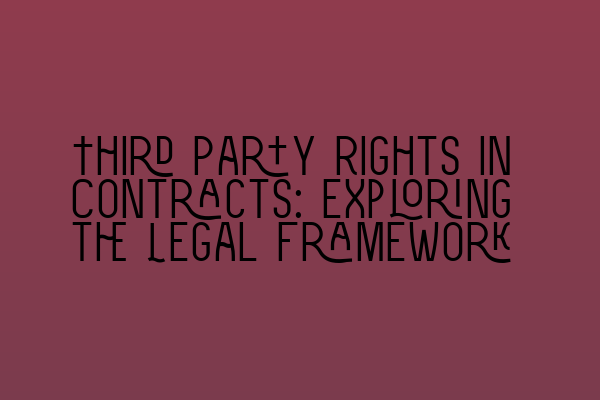Third Party Rights in Contracts: Exploring the Legal Framework
Contracts are an integral part of modern business transactions, providing a framework for individuals and companies to establish legally enforceable rights and obligations. However, what happens when a contract involves parties beyond the original signatories? This is where the concept of third-party rights comes into play. In this article, we will explore the legal framework surrounding third party rights in contracts, including their definition, types, and enforceability.
Definition of Third Party Rights
Third party rights refer to the ability of a person or entity that is not a party to a contract to acquire certain rights or benefits from that contract. In other words, a third party may gain the ability to enforce or rely upon contractual terms, even though they did not originally sign the contract. These rights may arise through specific provisions in the contract, legislation, or common law principles.
Types of Third Party Rights
There are two main types of third party rights in contracts:
- Third Party Beneficiary: A third party beneficiary is an individual or entity who is not a party to the contract but is intended to benefit from it. This intention can be expressly stated in the contract or implied from the circumstances surrounding the agreement. Third party beneficiaries may have the right to enforce the contract or assert a claim against one or both of the original contracting parties.
- Assignment of Rights: Assignment of rights involves the transfer of one party’s rights under a contract to a third party. This can occur when the original party wishes to delegate their contractual rights to another party. The third party who receives the assigned rights can then enforce those rights against the other party to the original contract.
Enforceability of Third Party Rights
The enforceability of third party rights depends on various factors, including the jurisdiction, the terms of the contract, and the applicable legislation. In some cases, third party rights are explicitly recognized and protected by law, while in others, they may be subject to restrictions or limitations.
In the United Kingdom, the concept of third party rights is governed by the Contracts (Rights of Third Parties) Act 1999. This legislation provides a statutory framework for the enforcement of third party rights in contracts. According to the Act, third party rights are enforceable if:
- The contract expressly identifies the third party as having the right to enforce the terms;
- The contract confers a benefit on the third party, and the third party has relied on the contract; or
- The terms of the contract make it clear that the parties intended to confer a benefit on the third party.
It is important to note that the Act also allows contracting parties to expressly exclude or limit third party rights, provided that the exclusion or limitation is clear and unambiguous. Therefore, when drafting or negotiating contracts, it is crucial to consider whether third party rights should be included or excluded, depending on the specific circumstances of the transaction.
Practical Considerations
When dealing with contracts that may involve third party rights, there are several practical considerations to keep in mind:
- Clear and Precise Contract Language: It is essential to draft contracts with clear and precise language that explicitly addresses the potential inclusion or exclusion of third party rights. This can help avoid ambiguity or disputes regarding the enforceability of such rights.
- Intention of the Parties: The parties should clearly indicate their intention regarding third party rights. Whether they want to allow third parties to enforce the contract or exclude any such rights should be clearly stated in the contract.
- Understanding the Legal Framework: Familiarize yourself with the applicable legislation and case law surrounding third party rights in your jurisdiction. This will help you navigate the legal landscape and ensure compliance with relevant legal requirements.
Conclusion
Third party rights in contracts can significantly impact the rights and obligations of parties involved. Understanding the legal framework and implications of third party rights is crucial for both solicitors and individuals entering into contractual agreements. By ensuring clear and precise contract language, considering the intention of the parties, and staying informed about the applicable legislation, parties can effectively navigate the complex world of third party rights and mitigate any potential risks or disputes.
To further enhance your understanding of contract law and prepare for the Solicitors Qualifying Examination (SQE), we recommend exploring our related articles:
